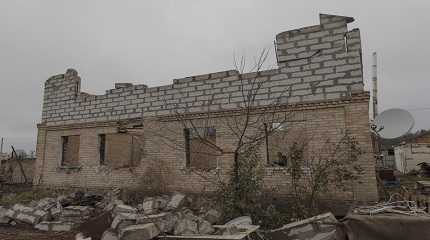
KYIV, June 9 (Reuters) - Moscow and Kyiv both reported heavy fighting in Ukraine on Friday, with bloggers describing the first sightings of German and U.S. armour, signalling that Ukraine's long-anticipated counterattack was under way.
With virtually no independent reporting from the front lines and Kyiv saying little, it was impossible to assess whether Ukraine was penetrating Russian defences in its bid to drive out occupying forces.
"We can state for sure that this offensive has begun," Russian President Vladimir Putin said in Sochi. "Ukrainian troops did not achieve their goals in any sector."
Ukraine's President Voldymyr Zelenskiy said he had discussed tactics and "achievements" with military leaders but gave little away.
"For our soldiers, for all those who at this time are engaged in particularly heavy combat. We see your heroism, and we are grateful for every moment of your lives," he said in his nightly video address. "Ukraine is as free as you are strong."
The counteroffensive is ultimately expected to involve thousands of Ukrainian troops trained and equipped by the West. The United States announced an extra $2.1 billion in security assistance on Friday, including air defence and ammunition.
Russia, which has had months to prepare its defensive lines, says it has repelled attacks since the start of the week. Kyiv has said its main effort has yet to begin.
Moscow and pro-war Russian bloggers reported intense battles on the Zaporizhzhia front near the city of Orikhiv, around the mid-point of the "land bridge" linking Russia to the Crimea peninsula, seen as one of Ukraine's likeliest targets.
Ben Barry, senior fellow for land warfare at the International Institute for Strategic Studies, said reports from the Russian bloggers of German-made Leopard tanks and U.S. Bradley armoured vehicles near Tokmak south of Orikhiv, if confirmed, would provide the first evidence that Ukraine's new brigades of Western-armed troops had joined the battle.
In all, Kyiv has 12 brigades totalling 50,000-60,000 troops ready to unleash in the counteroffensive. Nine of the brigades have been armed and trained by the West.
"They've got a choice of how many they commit initially and how many they keep in reserve in case the battlefield dynamics change," Barry said, adding that Ukraine's initial priority would be trying to keep the Russians off balance and gain tactical surprise through deception and camouflage.
The Russian defence ministry said its troops had repelled two Ukrainian assaults south of Orikhiv and four near Velyka Novosilka further east, where it said Ukraine's attack force included two battalions of troops supported by tanks. Several battalions of up to 1,000 troops comprise a brigade.
The southern front is where Ukrainian forces are widely expected to attempt their main push, towards the coast. Deputy Defence Minister Hanna Maliar said only that battles were continuing for Velyka Novosilka and Russian troops were mounting "active defence" at Orikhiv.
In the east, Ukraine has reported advances around Bakhmut, which Russian forces captured last month after nearly a year of the deadliest ground combat in Europe since World War Two. Ukraine generally bars journalists from reaching its side of front lines during offensive operations.
FLOOD DISASTER OVERSHADOWS FIGHTING
The initial days of the counteroffensive have been overshadowed this week by a huge humanitarian disaster after the destruction of the Kakhovka dam holding back the waters of the Dnipro River that bisects Ukraine.
Thousands of people have been forced to evacuate homes flooded in the war zone, vast nature preserves have been wiped out and the destruction to irrigation systems is likely to cripple agriculture across much of southern Ukraine for decades. Kyiv said at least four people had died and 13 were missing.
Ukraine's security service released a recording on Friday of what it described as an intercepted phone call in which a Russian soldier confides to another man that a Russian sabotage group had blown the dam up. Moscow says Ukraine sabotaged it.
Western countries say they are still gathering evidence but argue that Ukraine would have no reason to inflict such a devastating disaster on itself, especially right as its forces were shifting onto the attack.
In Hola Prystan on the Russian-occupied side of the river, rescuers evacuated residents in rubber dinghies. Villagers carried pets or small children to safety.
"Our house was carried away by a torrent of water," said a woman who gave her name as Oksana, being evacuated in a boat with her teenage daughter and their two dogs.
Some relatives of people in Russian-controlled flooded areas said their loved ones were still stuck on roofs with dwindling food supplies. The United Nations has no access to those areas, its Humanitarian Coordinator in Ukraine Denise Brown said, adding that some 17,000 people were affected in Ukrainian-controlled areas, with numbers changing "by the minute".
The river divides the two sides, which accuse each other of shelling across it, interfering with rescue efforts. The Kremlin said Ukrainian shelling had killed people including a pregnant woman. It provided no evidence.
Ukraine's general staff said on Friday evening there had been 27 armed engagements in the east over the past 24 hours.
It also reported 58 Russian air strikes and 31 incidents of Russian shelling. "Unfortunately, there are civilian deaths and injuries and damage to private homes, a hospital and other infrastructure," it said, without elaborating.
Ukraine launched 16 air strikes it said, giving no indication of whether the front line had moved.
Russian officials said Ukraine had struck the Russian city of Voronezh with a drone, wounding three people, and reported other drone attacks in Belgorod and Kursk. Kyiv withholds comment on reports of attacks inside Russia.




